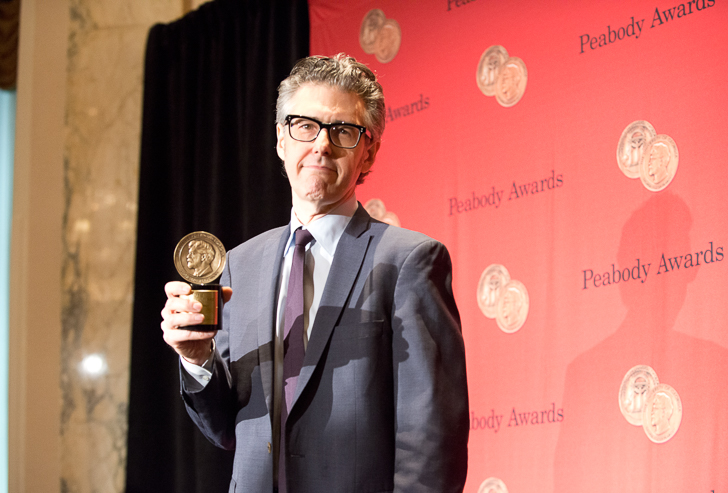
Courtesy of the Peabody Awards
By Jonah Hinebaugh
The best quotes for a story come when you don’t act like a robot and, instead, treat someone like they’re a real person.
This was just one of many revelations from Ira Glass, host of “This American Life,” who spent Saturday afternoon with students and faculty from USF St. Petersburg before his evening event at the Mahaffey Theater.
Afternoon attendees were treated to a personalized version of his later event, starting with Glass having each audience member briefly talk about what they were studying or interested in.
Using podcasts as a baseboard and a tablet to mix audio clips from his shows, Glass dove into the details of narrative storytelling, his rise from a lowly intern and the state of journalism.
“Whenever you move into narrative, you have this incredible magnetic force,” he said. “One of the things that’s most powerful about it is that you will get people to listen to stories about things they don’t even think they’re interested in.”
The structure came through trial and error during his early years at NPR as an intern. In fact, his work turned out pretty mediocre throughout his early 20s, he said.
Glass said he would pay other reporters to read his scripts and edit them in front of him, all the while receiving messages from his parents telling him it’s not too late to go to medical school.
But he stuck with it and found that he never wanted to cover high-profile public officials or celebrities, but rather everyday life.
He eventually graduated to working on NPR staples like “All Things Considered” and “Morning Edition.”
His next break came when he received a grant to start “This American Life,” which now has more than 2 million listeners each week and another 3.6 million people downloading the podcast version, according to the show’s website.
Part of the success, he said, is the style in which he and his staff present the content.
“I feel like there’s a corny idea that you have to choose between being a serious journalist and an entertainer,” Glass said.
“We’re trying to say you can do both with equal aggressiveness. We want it to be like, the most new coverage of what’s real and what’s important, but we also want it to be just as entertaining as (though) it’s the best TV. We want to pull you in and pull you forward.”
Audience member and WUSF intern Delaney Brown asked Glass how he’s able to do that without compromising his objectivity.
“The thing I find myself struggling with all the time is: How do you tell these stories that are really heavy with compassion without risking your objectivity?” Brown said at the event. “And how do you do that in a way that you can get people to really listen without being off-putting and, like, shooting yourself in the foot?”
In Glass’ mind, the idea of perfect objectivity is outdated, and the way to evoke compassion from listeners is to have it yourself.
“The practical way to think about objectivity in the actual working (way) is you want to think about fairness,” he said. “You have to think no one is ever going to be objective, I’m not, you’re not. So perfect objectivity is not a thing to shoot for, it’s not a practical thing to shoot for.
“But what you can shoot for, and what you can always achieve, is fairness. The way that you achieve fairness is that in any dispute, you hear out all parties equally and give them all an equal shot.”
Later, Glass went on to detail what he thinks are the three basic rules of journalism: do everything you can to figure out what is true, be equally fair to all the people in the story and, finally, “if you have something shitty to say about somebody, you say it to their face.”
The 60-year-old seemed keen on helping the young crowd in their careers, even pledging to buy copies of “Out on the Wire: The Storytelling Secrets of the New Masters of Radio” by Jessica Abel for those interested.
To close out the hour-and-a-half event, Glass discussed what he called a “war” in our country.
“I would say, especially to the journalism students, if you’re really thinking about doing this, we’re at war in our country. I think it’s really not an exaggeration to say (we’re at war) between fact-based reporting and propaganda. So it’s an important time to be a reporter. It’s an important time to be about the truth, and we’re going to fight, and we could use more people.”
To listen to “This American Life, tune in to WUSF 89.7 on Saturdays at noon.


